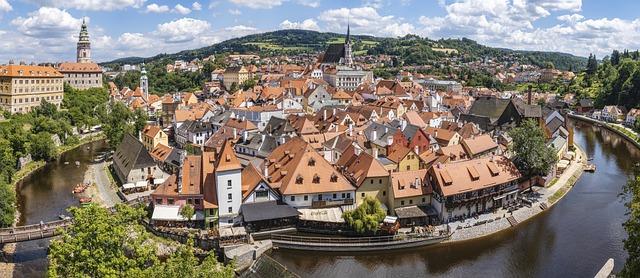Moldovas Journey In the direction of EU Integration
As Moldova continues its journey in the direction of deeper integration with the European Union,a number of pivotal initiatives and reforms are reshaping the political and financial panorama of the nation.The federal government has actively pursued alignment with EU requirements,specializing in key areas corresponding to governance,openness,and financial growth. Crucial to this path is the implementation of the Affiliation Settlement signed in 2014, which established a framework for nearer cooperation. This settlement has unlocked numerous types of help from the EU, offering Moldova with alternatives to spice up commerce, improve its authorized system, and enhance public administration by intensive capacity-building packages.
To gauge the progress of Moldova’s integration efforts, numerous indicators have been set towards EU benchmarks. The federal government has established a collection of objectives, which embrace:
Judicial Reforms: Strengthening the independence and effectivity of the judiciary.Anti-Corruption Measures: Implementing sturdy anti-corruption methods and accountability mechanisms.Financial Development: Increasing financial ties with member states and attracting overseas investments.
Moreover, public sentiment in Moldova displays a robust want for integration, as evidenced by excessive ranges of help for EU membership in current polls.This enthusiasm is pivotal for sustaining momentum and overcoming challenges, corresponding to political instability and exterior pressures. The trail forward is fraught with complexities; nevertheless, the dedication of Moldovan society and its management signifies a steadfast resolve to embrace European values and requirements.
Key Financial Reforms Forging Stronger Ties with Europe

Moldova is embarking on a transformative journey fueled by a collection of strategic financial reforms aimed toward deepening its relationship with the European Union. These adjustments are important for aligning Moldova’s financial framework with European requirements, paving the best way for enhanced commerce, funding, and cooperation.Among the many most necessary reforms are:
Judicial Reforms: Establishing an unbiased judiciary to foster transparency and accountability.Anti-Corruption Measures: Strengthening mechanisms to fight corruption, thereby rising investor confidence.Regulatory Enhancements: Streamlining enterprise rules to create a extra conducive surroundings for entrepreneurship.Commerce Liberalization: Increasing agreements that get rid of tariffs and encourage free commerce with EU markets.
Along with these reforms, Moldova can be investing in key sectors that can help its financial integration with Europe. Infrastructure growth is on the forefront, with tasks aimed toward modernizing transportation and vitality programs.Such investments are essential not just for supporting financial progress but in addition for facilitating cross-border connectivity. A snapshot of present infrastructure endeavors consists of:
ProjectStatusProjected completionroad RehabilitationOngoing2025Energy Grid ModernizationPlanned2026Railway UpgradeCompleted2023
The Function of Civil Society in Supporting EU Aspirations

In the journey towards European integration,civil society performs a pivotal position by appearing as a bridge between residents and policymakers. Non-governmental organizations (NGOs), grassroots actions, and advocacy teams contribute considerably to shaping public opinion and mobilizing collective motion. They supply platforms for dialog, guaranteeing that the voices of unusual residents are heard in the political enviornment. By training and consciousness campaigns, these entities empower people to know their rights and duties throughout the context of EU collaboration, fostering a way of belonging and participation in democratic processes.
Furthermore, civil society organizations are instrumental in monitoring governmental actions and guaranteeing transparency. By holding authorities accountable, they create an surroundings of belief and collaboration vital for the EU integration course of. Key capabilities embrace:
Advocacy: Lobbying for insurance policies that align with EU requirements and values.Analysis: Conducting research and offering knowledge to tell decision-making.Capability Constructing: Coaching and growth packages to boost civic engagement.
By actively selling these core actions, civil society strengthens democratic practices and promotes alignment with European values, finally paving the best way for a extra sturdy partnership between Moldova and the European Union.
Navigating Geopolitical Challenges within the Quest for EU membership

The journey in the direction of European Union membership for Moldova is fraught with advanced geopolitical challenges that require strategic navigation. Because the nation endeavors to align itself with EU requirements and insurance policies,it faces appreciable obstacles,each inner and exterior. some of the important thing points embrace:
Recurring Political Instability: Moldova has skilled frequent adjustments in authorities, which might hinder constant coverage implementation.Corruption: Tackling systemic corruption stays a major hurdle, as it undermines public belief and slows reform processes.geopolitical Stress: The affect of close by powers, notably Russia, poses a threat to Moldova’s aspirations, complicating its overseas relations and nationwide safety.
Furthermore, Moldova’s dedication to EU values necessitates addressing social and financial disparities inside its borders. The nation should prioritize reforms that foster financial progress and social cohesion, paving the best way for a robust request to hitch the EU. Essential areas of focus embrace:
Focus AreasSignificanceJudicial ReformsEssential for constructing belief in state establishments.Financial DiversificationReduces dependency on any single market and will increase resilience.Human Rights ProtectionCritical for assembly EU’s important values and requirements.
Addressing Corruption: A Crucial Step for Moldovas European Future

The pervasive subject of corruption in Moldova presents a formidable barrier to its ambition of European integration. By fostering a tradition of transparency and accountability, Moldova can pave the best way for significant reform.Key initiatives embrace:
Judicial Reform: Strengthening the rule of regulation by an unbiased judiciary that’s free from political affect.Anti-Corruption businesses: The institution and empowerment of devoted our bodies to analyze and prosecute corruption successfully.Public Sector Transparency: Implementation of rigorous rules for public spending and procurement processes.
Furthermore, collaboration with EU companions affords Moldova the prospect to undertake finest practices in governance and anti-corruption measures. an analysis of corruption threat is crucial, with areas that want pressing consideration listed within the desk beneath:
Space of ConcernRisk LevelPublic ProcurementHighJudicial IndependenceMediumPolitical FinancingHighLaw Enforcement IntegrityMedium
Addressing these areas diligently won’t solely foster nationwide confidence however additionally align Moldova nearer to the democratic requirements anticipated by the European Union. This proactive strategy is not only an obligation however an important stride in the direction of a sustainable and affluent future inside a united Europe.
Strengthening Human Rights and Democratic Establishments in Moldova

Lately, Moldova has made notable strides in strengthening its human rights framework and enhancing democratic establishments, fueled by aspirations for deeper integration with the European Union. The federal government has undertaken steps to align its laws with european requirements,prioritizing key areas corresponding to judicial independence,anti-corruption measures,and the safety of minority rights. Institutional reforms have included the institution of unbiased our bodies tasked with monitoring human rights violations, and the enhancement of mechanisms for residents to report grievances. Consequently, civic engagement and accountability are steadily bettering, fostering a extra vibrant civil society.
Nevertheless, challenges stay on the trail towards consolidating these developments. Points corresponding to political instability,media freedom considerations,and the affect of oligarchic constructions proceed to pose important obstacles. The EU’s help by numerous funding packages and coverage dialogues performs a essential position in addressing these challenges. Key areas for ongoing focus embrace:
Strengthening the rule of lawEnhancing electoral integrityPromoting freedom of expressionsupporting minority rights
The ongoing collaboration between Moldova and the EU serves as a vital framework for advancing these targets, finally aiming to create a sturdy, democratic society that respects human rights and fosters civic participation.
Insights and Conclusions
Moldova’s path in the direction of nearer ties with the European Union represents a major chapter in its ongoing quest for political stability, financial growth, and social conversion. The nation’s dedication to aligning with EU requirements and values is indicative of a broader aspiration for integration into the European fold, reflecting each the hopes of its residents and the geopolitical dynamics of Jap Europe. Whereas challenges corresponding to corruption, governance, and financial disparity stay, Moldova’s efforts to implement reforms and set up a sturdy partnership with the EU exhibit a resilience that might pave the best way for a extra affluent future. As worldwide observers proceed to observe this evolving relationship, the result will undoubtedly play a vital position in shaping Moldova’s id and its place inside Europe within the years to come back. the stakes are excessive,not only for moldova,however for the steadiness and unity of the area as an entire.
Source link : https://europ.info/2025/03/02/moldova/moldova-european-union/
Writer : Noah Rodriguez
Publish date : 2025-03-02 12:28:00
Copyright for syndicated content material belongs to the linked Source.


